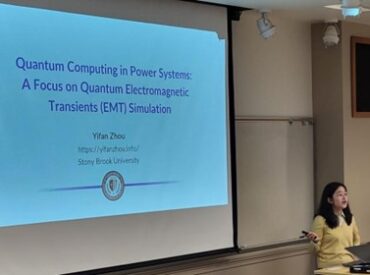Quantum Computing in Power Systems: A Focus on Quantum EMT Simulation
Date: January 15, 2025
Topic: Quantum Computing in Power Systems: A Focus on Quantum EMT Simulation
 Speaker: Yifan Zhou is an Assistant Professor in the Department of Electrical and Computer Engineering at Stony Brook University since 2022. She received her Bachelor’s degree with the highest distinction in 2014 and her Ph.D. degree in 2019, both from the Department of Electrical Engineering at Tsinghua University. Her research focuses on collaboratively integrating machine learning, quantum computing, and formal methods to enable intelligent and adaptive power system operations and support renewable energy integration. She is an Associate Editor of IEEE Journal of Oceanic Engineering, Energy Reports, and IEEE Access (PES Section).
Speaker: Yifan Zhou is an Assistant Professor in the Department of Electrical and Computer Engineering at Stony Brook University since 2022. She received her Bachelor’s degree with the highest distinction in 2014 and her Ph.D. degree in 2019, both from the Department of Electrical Engineering at Tsinghua University. Her research focuses on collaboratively integrating machine learning, quantum computing, and formal methods to enable intelligent and adaptive power system operations and support renewable energy integration. She is an Associate Editor of IEEE Journal of Oceanic Engineering, Energy Reports, and IEEE Access (PES Section).
Abstract: Interconnected power systems are one of the largest and most complicated man-made dynamic systems on this planet. Scalable power system analytics is the keystone to the resilient operation of large transmission and distribution grids. Yet, the increasing integration of renewables and the swift expansion of communities are challenging the limits of classical computing, calling for transformative power grid analytics. Recently, quantum technologies have attracted significant interest in power systems. Quantum computing harnesses quantum mechanisms to solve traditionally intractable computational problems, which may lead to ultra-scalable and effective power system solutions.
This talk will present our recent work on developing quantum-enabled power grid analytics, with a particular focus on the Quantum Electromagnetic Transient Program (QEMTP). I will begin with a brief overview of the fundamentals of quantum computing and the critical role of electromagnetic transient (EMT) simulations in modern power systems. I will then introduce our QEMTP technologies that successively tackle challenges of feasibility, deployability, and scalability. Further, I will demonstrate QEMTP’s implementation on IBM quantum facilities and its performance in real-scale power grids. Finally, I will briefly talk about our work beyond QEMTP, including the application of quantum machine learning and quantum optimization in power system operations.
Attendance was 10 Industry members and 22 Students.


